The American packaging of Aroy D coconut milk says "coconut milk 100%" which makes you think it is additive free. But it is false, Aroy D coconut milk contains E435 additive!! It is not AIP compliant and anyone with an autoimmune condition or a leaky gut should stay away from it!
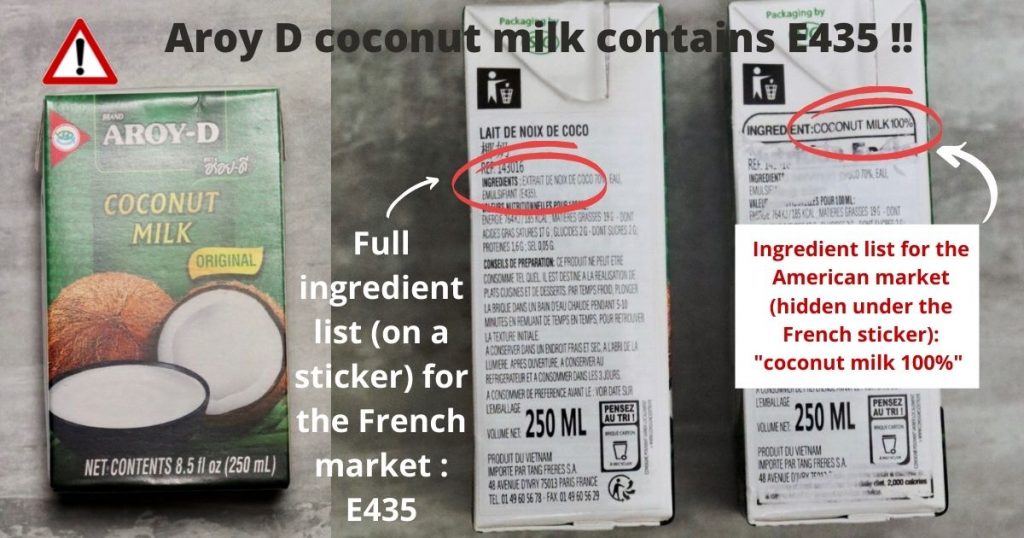
I have seen Aroy D coconut milk being praised and recommended multiple times on paleo or AIP websites. Please note that I am not accusing those websites, they have been fooled like anyone else.
A few months ago, out of curiosity I wanted to try this specific brand's coconut milk as it has great reviews. So I first went online to check it out.
As you may know, I'm a French food blogger who blogs both in French and English and a large part of my readers are American. So I'm always navigating between American websites and French websites.
Finding out something was odd with the ingredients
When I first checked Aroy D coconut milk on an American online grocery store the first thing that caught my attention was the ingredient listed on the package: "100 % coconut milk".
Well, I thought that was odd. For me "coconut milk" is not a primary ingredient. Coconut milk is the result of coconut and water. So in my opinion you should see on all coconut milk packages at least two ingredients (which percentages vary from one brand to another): coconut and water.
Growing up with a father who is an ingredient expert, I've been raised to read all labels very carefully. He has also taught me to read between the lines, looking for cheats. He raised me to be aware of the incredible amount of fraud in the food industry all over the world.
After checking the Aroy D coconut milk on the American online grocery store I went on a French one. And I discovered that the ingredients for Aroy D coconut milk are not the same. It clearly says: coconut extract (70%), water, emulsifier (E435).
Then I went on a British online grocery store and checked Aroy D coconut milk. It had the same ingredients as in France. And for the UK version it looks like the ingredients are not on a sticker but directly on the carton.
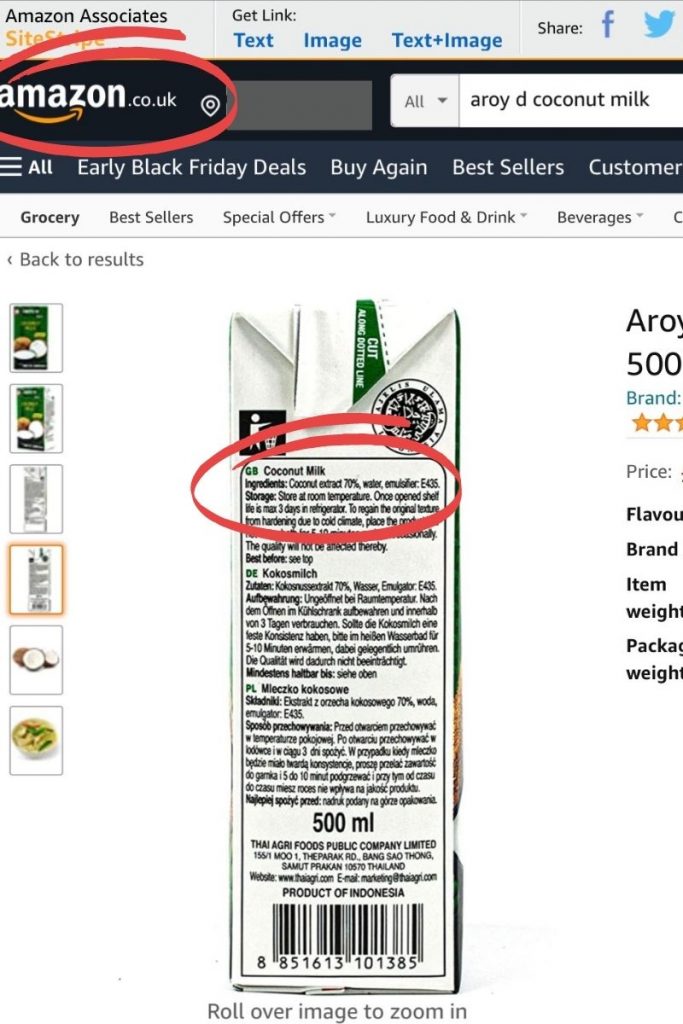
And if you look at this European packaging, it's translated in German and Polish also with emulsifier (E435).
First, I think the ingredient list "100% coconut milk" doesn't make sense. Then I find out that Aroy D seem to have a different recipe only for the US. That's weird.
So I needed to get to the bottom of this.
Confirming my suspicion
I had this at the back of my mind for several months but didn't know how to prove my suspicion. Until last night when the penny finally dropped.
As I was searching for coconut milk for a new recipe I'm working on I came across one of Aroy D coconut milk carton online.
And I saw on the picture that the French ingredient list was a sticker stuck on the carton that seemed to be the carton made for the American market.
Only thing I had to do was go to my local Asian grocery store in Paris and buy a pack of Aroy D coconut milk and see for myself if what I was suspecting was true.
And here is a video of the result, so you can see for yourself.
Video
Aroy D coconut milk contains E435
As you can see on this video, I removed the sticker that had the ingredients written in French on it. It clearly says: extrait de noix de coco (70%), eau, émulsifiant (E435). Which is French for: coconut extract (70%), water, emulsifier (E435).
Underneath this sticker was hidden the American version of the ingredient list: "100% coconut milk". Which makes you think that it has no additives but it is false!
Dear American readers, this coconut milk contains E435 and you are not told about that!!
E435, also known as Polysorbate 60, is used in foods as a stabilizer and emulsifier.
According to the French Federal Union of Consumers (UFC Que choisir) E435 has been pointed by some researches as a potential worsener of leaky gut. It may also contribute to gut dysbiosis and auto immune response.
So, I would recommend staying away from it if you have an autoimmune condition or any gut issues. And if you are following the autoimmune protocol (AIP), as you might have guessed, in reality this coconut milk is not AIP compliant.
I agree with Vani Hari from the blog foodbabe.com, nobody is watching out for you guys! (By the way I highly recommend reading her article Food in America compared to the U.K. (Why is it so different?))
How to try to avoid getting fooled by ingredient lists
First of all, ask yourself if the ingredient list makes sense. Like in this case "coconut milk 100%" when it should be at the very least "coconut and water".
Then, when in doubt, you can explore how the same product is labeled all over the world. Thanks to the internet and online stores it's pretty easy to do that. Even if I don't speak German nor Polish, I can figure out what it says. Before confirming my suspicions with the product itself, I first checked by going online and saw that things were odd.
And of course, you can also contact the brand to ask. The question will then be "can you trust the answer?"...
And if you have any doubts (for example if the texture looks "too good to be true"): don't eat the product.
Please share this post with all of your family members and friends. Everyone should know what they are eating.
Did you like this article? Please leave a review below! Also, let's stay connected on social media! You can find me on Instagram, Facebook and Pinterest.


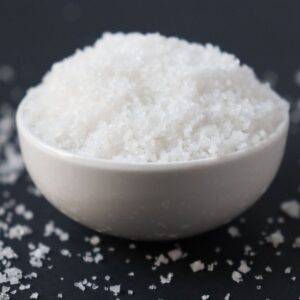
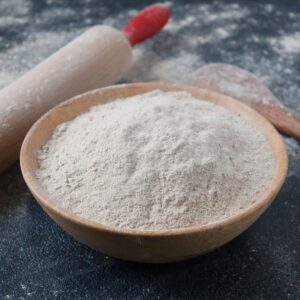
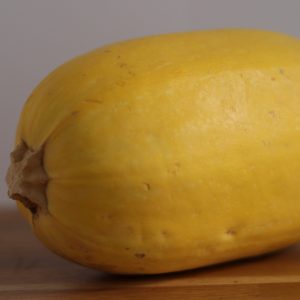
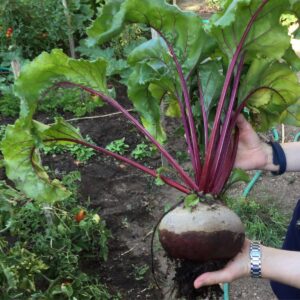
Shawna
Thank you so much for this post. I believe not detailing all ingredients for products that are used by living beings should be illegal and heavily regulated. We have the right to know what is going in our bodies. Most of my foods are made 100% from scratch but I cheat sometimes with items such as coconut milk, bakery bread, and peanut butter. Just this morning, I thought I was being healthy using Aroy D coconut milk. I chose it because it said 100% coconut milk and another brand had gums. After I brought it home, I thought it tasted natural but it was something different about it. I decided to research this when I realized the expiration date is in December and wondered how it would be possible for it to last so long because it only lasts a few days when I make it. The emulsifier E435 is supposed to stabilize the milk and improve the texture. Since when does that need to be done for milk? When the water separates, we just shake it.
Melanie
This is very interesting information and great sleuthing!
Is there any difference between the organic and non-organic versions of Aroy D? I've been using the organic version and the ingredients say "organic coconut extract 60%, water"
What do you think is the highest quality canned coconut available in the US?
Thanks
Melanie
BTW, the product I use is a 14fl oz can of "Aroy-D Organic Coconut Milk"
Heather Rodd
i just bought a can for the first time last night. In the can it labels polysorbate 60. i felt sick hours after ingesting 1/2 a cup of coconut curry I made with it.
Shari
Gosh, I've been buying Aroy-D coconut milk in the carton for years in the USA. I don't seem to have problems, and I make everything with it. But now I'm going to have to find a new brand. I'm wondering if you've seen Thai Kitchen coconut milk in the box? It appears to only have 2 ingredients, coconut and water. I'll have to check other countries to see if that one also is hiding some secret ingredient. Can't be too careful these days. Thank you for enlightening me! (And I just ordered 12 boxes of Aroy-D!)
Gina Boland
Ok so weird- I have celiac disease and a very sensitive leaky gut that I have spent the last decade learning about (it was hard in my 20s!) - but I have been purchasing canned coconut milk for curries for as long as I can remember, and the only brand I found DIDNT make me sick, was Aroy D-
BUT I recently grabbed a bunch not looking at the ingredients because I trust the brand, and when I opened the can, I had a clear disgusted feeling regarding it, like I had with other brands, unusual. I check the ingredients and it does have this polysorbate 60 in there. What the heck?!
Come to find out I had previously been getting the cans of Aroy D that are FROM and FOR Thailand from my local grocery outlet. They are black cans with the same pictures, and have only coconut and water in them. Those don’t make me sick. The green cans of Aroy D that are for the US have the polysorbate 60 in them. You can look Aroy D coconut milk up on Amazon and see the different labels/types. What’s bizarre is I finally found out why sometimes coconut milk makes me nauseous and sometimes it doesn’t.
What the actual heck? Why is Americas food system so whack?
Ludo
Interesting article, thank you Bea. I didn't know it was possible to "play" so easily with labeling, it's scary.
I am a French reader and also chef. I allow myself to give you this information concerning coconut milk, I hope this will be useful to you :
Coconut extract is obtained by pressing the white pulp of grated coconut. Water is then added to achieve the desired fat content for the production of coconut milk and cream.
-The fat content of coconut milk is between 10 and 19%
-The fat content of coconut cream is between 20 and 28%
I use Kara coconut cream to make my curries, this company makes good products, without additives or preservatives.
Enjoy!
https://kara-coconut.fr/
Bea C.
Hi Ludo. Thanks for your comment full of useful information! Unfortunately I'm not sure if Kara is available worldwide.
TruthLover
Kara coconut cream/milk contains Guar - and Xanthan gum (sometimes even Carrageenan is labelled) and they label those ingredients in Asia. Better remove the sticker … 🙂
Bea C.
Kara brand sells 2 different coconut milks. One that does indeed contain guar and xanthan gum (and it is clearly written on the package, at least over here in France). And another coconut milk that does not contain anything other than coconut and water (at least from what is clearly written on the box).
Mery
Hi I just find out that company change the label for US market ti include the chemicals
I'm so disappointed
Amy
Where do you purchase this product? I cant seem to find it in stores. I found it on Amazon but there are so many different labels and they all say UHT and Im just not sure which one to trust! Especially after being conned by Arro D!
Amy
I just commented and spelled the product wrong. Oops! Should be Aroy D
Eliz
Thank you for this information. My usual source, for the boxed and canned versions of this product, has stopped carrying it and I was hoping to find another source. This may be why they stopped. We are so much, at the mercy of these food companies and it's apparent, that they don't have much to give. We'll have to buy coconuts whole and make the stuff ourselves before long.
Have a great day!
Lena
https://www.drgoerg.com/en/coconut-products/organic-coconut-milk/
I bought this (above) coconut milk today and they clearly say: no added water and no any aditives, so i guess it is possible. They even say it is ok for raw foodists, which would mean it is not heated above 45 degrees (celsius).
amary
I think they are actually playing the same game as Aroy-D. Coconut milk is, by definition, coconut extract (usually 60-70%) and water. They are claiming that there is no *additional* water beyond the 30% intrinsic water! (You can sometimes find "light" or "low-fat" coconut milk, which is just regular coconut milk with more water added!) Dairy milk could also claim to be 100% milk (with "INGREDIENT: MILK 100%") and to have no added water, even though it comprises 87% water.
A good way to check is to simply look at the percentage of fat content. This has 17g of fat per 100ml serving, which is in line with what this 70% Aroy-D has (they also sell some that is 60% coconut).
Lidia
Hi Bea, first of all thank you for your article and all the work you do to help people.
I just just came back from my vacation in Caribbean and I consumed aroy -D every single day , particularly in the carton od 1 liter. The first time I have ever tried it was back in 2019 when I was in Thailand and I was so happy to found such a tasty and emulsifier free coconut milk as on the label it was only 100% coconut milk.
I live in Serbia and when I came back I was desperately trying to find that milk as I cannot use diary. But there was no place here to buy it. And now when I came back from my vacation in Barbados I found out that one mega market in my city has it.
I went there and just bought a bunch of cartons.I didn't look the label as in Thailand and Barbados it was both labels 100% coconut milk so I didn't even think it can be a thing to have different ingredients when it's identical package and producer.
But when I open it and put a little in my black tea I saw it was a bit strange taste.
Then I looked at ingredients at it says coconut extract 70%, water, emulsifier:E435. I was shocked!!!
I did not expect that at all. So I started doing research and found your article on this.
I wonder how long they have been poisoning people all over the world and how can they even allow those highly hazardous substances to be in the food.
Oh yes, I forgot - everything in the name of profit!
Sue
I wish I had seen this article before I used this in my curry last night. HORRIBLE digestive problems this morning. I suspect there are sulfites in here as well, because that's usually what gets me. I purposely bought this brand over the other one that disclosed the metabisulfite. I wouldn't suggest this to anyone with issues. I literally feel like I can't trust any foods that aren't 100% fresh and prepared at home.
Bea C.
Hi Sue. I'm sorry you found out about this the hard way. Like I say in the article, according to the French Federal Union of Consumers E435 (also known as Polysorbate 60) has been pointed by some researches as a potential worsener of leaky gut. So I think you reacted to the emulsifier E435.
Wenchypoo
Question: is this in just the cartons, or in the cans too? I've been buying Aroy-D in cans for YEARS--the carton stuff only became available in U.S. stores in my area within the last few years or so. I wonder if I've been polluting my arthritic self all along...I've never had problems with it not separating after an overnight trip in the fridge upside-down (so the cream winds up at the top of the can when turned right side-up and opened).
Fast-forward to 2022, and I have switched to Blue Dragon brand canned coconut milk (much cheaper), and believe me, it DOES separate, even at room temp! I have no idea if that's good or bad, but it does the job. No other ingredients listed except water and coconuts. When I shake the can to try to blend the solids back into the liquid, it only does so partially, so I would assume I'm pretty safe...for now.
Madina
Thank you so much, I'm following AIP, this info helps a lot, just wanted to order some of this milk. I can't find any chemical free alternative to milk in Kazakhstan, seems like mission impossible
Shua
Thank you for your article. I’ve been diagnosed with an autoimmune disease and have had to cut out so many food. I thought this coconut milk was great but was also suspicious of the labeling as well. It makes me so mad that the ingredients are not listed entirely on the product and I’ve been eating this for years. But praise be to the most high, I find your article today and will no longer be using this coconut milk. Thank you for all that you do and please continue this work.
Bea C.
Bonjour Shua. Thank you so much for taking the time to leave such a nice comment! I'm glad to hear that this article has helped you as I'm trying my best to look out for you guys. Best healing wishes for your autoimmune condition!
Amy
I, too, was delighted to find this tasty coconut milk with no additives to get me through my AIP elimination diet. Now I am wondering if this could be the cause of some of my bad days where I am wracking my brain trying to figure out what I ate! I looked up AIP and polysorbate 60 today because, for the first time, I saw a sticker on my carton today that listed that ingredient, and I needed to know if it was ok to have. The very first article that popped up, despite not even mentioning Aroy D, was this one! So upset about this! And yet, I am so grateful you called our attention to it! THANK YOU SO MUCH FOR HELPING US!!
I am also perplexed bc, despite eating cleaner that I have ever eaten in my life and being trim and fit, my LDL level was high at my physical and my doctor wants to do a CT of my heart to check for plaque. I am realising that between coconut milk, oil, manna, and cream, as well as bacon and beef (which I rarely ate before), I am eating upwards of 40 g saturated fat a day! Everything I read said that coconut sat fat is different and it wont affect my LDL, but it certainly did mine, so I plan to cut down. It will be a huge hole in my diet bc it has been a staple!! I have lost so much weight on AIP....I cant afford to lose more by cutting down on fat!!
Melanie
As an American who knows that we are lab rats and fed a daily dose of poison, thank you! I look at ingredients all the time and I want to throw everything out but I also want to feed and keep my children healthy. For some reason my 3 year old doesn’t like raw cow milk (from a small farm) so I can’t figure out what to give him. I hate American food. When I lived in Italy everything just tastes so much better. Do you or anyone have suggestions?